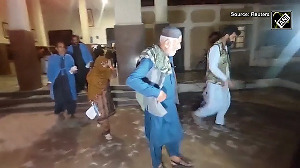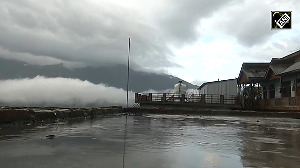Barely 48 hours after the election code of conduct came into force, a violation of the code has already been noticed by both the Public Works Department and the Water Resources Department.
The allegation against the two departments is that two days after the chief electoral officer issued a circular regarding the model code of conduct, the departments had sanctioned crores of rupees for road and water works.
In the circular issued by the CEO of Karnataka on April 3, 2008, there were 13 points regarding the model code of conduct. In point number six the circular states, "No schemes/programmes should be discussed or sanctioned. No funds should be released for new schemes/programmes and no assurances should be given for new schemes/programmes."
However, both the PWD and Water Resources Department held separate high level meetings on April 5.
In the meeting of the water resources department, a sum of over Rs 500 crore was sanctioned for the Cauvery Neeravari Nigam, Karnataka Neeravari Nigam and Krishna Bhagya Jala Nigam. All these are water projects to be implemented in various parts of the state.
In the high level meeting of the PWD, several crores of rupees were sanctioned for various works.
The minutes of the meeting indicate that an action plan was set up to undertake various works across the state.
The works included widening and improvement of roads in rural areas, improvement of state highways and maintenance of public buildings. All these plans were cleared too at the meeting.
The CEO's circular dated April 3 issued to all government departments and deputy commissioners across the state clearly states that no new programmes should be implemented.
K N Phanindra, legal advisor for the CEO, told rediff.com that the works undertaken amount to a clear violation. The election code of conduct clearly states that only emergency works can be undertaken and the nature of the works proposed by both these departments is clearly violative and the departments have ignored the direction of the CEO.
He says that the next course of action would be for some political party to complain to the CEO following which the next course of action could be initiated.
He said that if the violation was by a political party, then the party could have either been derecognised or strictures passed against it.
However, here we have a peculiar situation wherein we are under President's Rule. The CEO could seek an explanation from these departments and put all the projects on hold.






 © 2025
© 2025